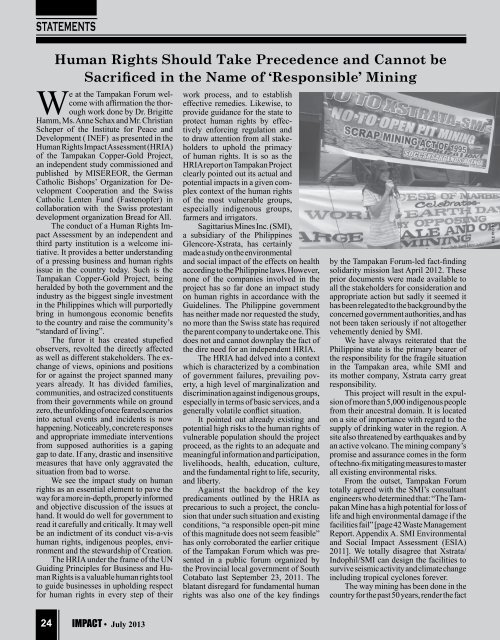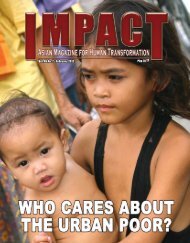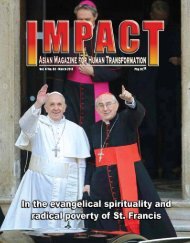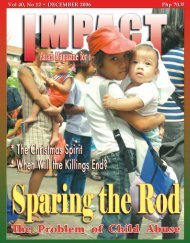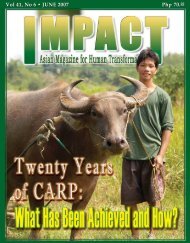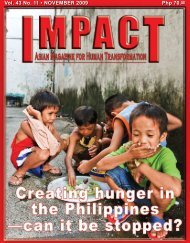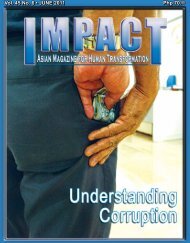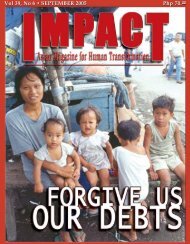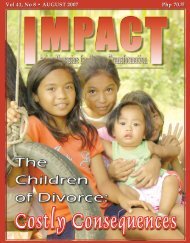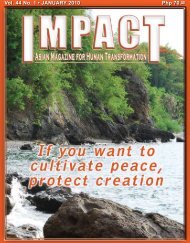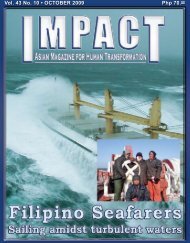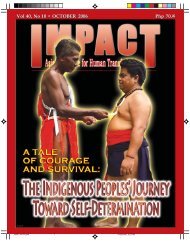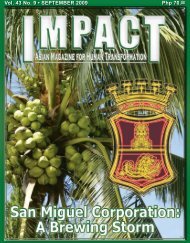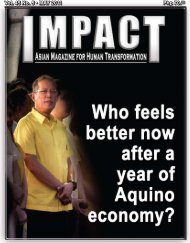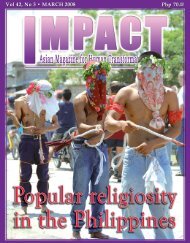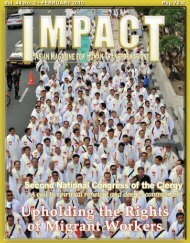Php 70.00 Vol. 47 No. 07 • July 2013 - IMPACT Magazine Online!
Php 70.00 Vol. 47 No. 07 • July 2013 - IMPACT Magazine Online!
Php 70.00 Vol. 47 No. 07 • July 2013 - IMPACT Magazine Online!
You also want an ePaper? Increase the reach of your titles
YUMPU automatically turns print PDFs into web optimized ePapers that Google loves.
STATEMENTS<br />
Human Rights Should Take Precedence and Cannot be<br />
Sacrificed in the Name of ‘Responsible’ Mining<br />
We at the Tampakan Forum welcome<br />
with affirmation the thorough<br />
work done by Dr. Brigitte<br />
Hamm, Ms. Anne Schax and Mr. Christian<br />
Scheper of the Institute for Peace and<br />
Development ( INEF) as presented in the<br />
Human Rights Impact Assessment (HRIA)<br />
of the Tampakan Copper-Gold Project,<br />
an independent study commissioned and<br />
published by MISEREOR, the German<br />
Catholic Bishops’ Organization for Development<br />
Cooperation and the Swiss<br />
Catholic Lenten Fund (Fastenopfer) in<br />
collaboration with the Swiss protestant<br />
development organization Bread for All.<br />
The conduct of a Human Rights Impact<br />
Assessment by an independent and<br />
third party institution is a welcome initiative.<br />
It provides a better understanding<br />
of a pressing business and human rights<br />
issue in the country today. Such is the<br />
Tampakan Copper-Gold Project, being<br />
heralded by both the government and the<br />
industry as the biggest single investment<br />
in the Philippines which will purportedly<br />
bring in humongous economic benefits<br />
to the country and raise the community’s<br />
“standard of living”.<br />
The furor it has created stupefied<br />
observers, revolted the directly affected<br />
as well as different stakeholders. The exchange<br />
of views, opinions and positions<br />
for or against the project spanned many<br />
years already. It has divided families,<br />
communities, and ostracized constituents<br />
from their governments while on ground<br />
zero, the unfolding of once feared scenarios<br />
into actual events and incidents is now<br />
happening. <strong>No</strong>ticeably, concrete responses<br />
and appropriate immediate interventions<br />
from supposed authorities is a gaping<br />
gap to date. If any, drastic and insensitive<br />
measures that have only aggravated the<br />
situation from bad to worse.<br />
We see the impact study on human<br />
rights as an essential element to pave the<br />
way for a more in-depth, properly informed<br />
and objective discussion of the issues at<br />
hand. It would do well for government to<br />
read it carefully and critically. It may well<br />
be an indictment of its conduct vis-a-vis<br />
human rights, indigenous peoples, environment<br />
and the stewardship of Creation.<br />
The HRIA under the frame of the UN<br />
Guiding Principles for Business and Human<br />
Rights is a valuable human rights tool<br />
to guide businesses in upholding respect<br />
for human rights in every step of their<br />
work process, and to establish<br />
effective remedies. Likewise, to<br />
provide guidance for the state to<br />
protect human rights by effectively<br />
enforcing regulation and<br />
to draw attention from all stakeholders<br />
to uphold the primacy<br />
of human rights. It is so as the<br />
HRIA report on Tampakan Project<br />
clearly pointed out its actual and<br />
potential impacts in a given complex<br />
context of the human rights<br />
of the most vulnerable groups,<br />
especially indigenous groups,<br />
farmers and irrigators.<br />
Sagittarius Mines Inc. (SMI),<br />
a subsidiary of the Philippines<br />
Glencore-Xstrata, has certainly<br />
made a study on the environmental<br />
and social impact of the effects on health<br />
according to the Philippine laws. However,<br />
none of the companies involved in the<br />
project has so far done an impact study<br />
on human rights in accordance with the<br />
Guidelines. The Philippine government<br />
has neither made nor requested the study,<br />
no more than the Swiss state has required<br />
the parent company to undertake one. This<br />
does not and cannot downplay the fact of<br />
the dire need for an independent HRIA.<br />
The HRIA had delved into a context<br />
which is characterized by a combination<br />
of government failures, prevailing poverty,<br />
a high level of marginalization and<br />
discrimination against indigenous groups,<br />
especially in terms of basic services, and a<br />
generally volatile conflict situation.<br />
It pointed out already existing and<br />
potential high risks to the human rights of<br />
vulnerable population should the project<br />
proceed, as the rights to an adequate and<br />
meaningful information and participation,<br />
livelihoods, health, education, culture,<br />
and the fundamental right to life, security,<br />
and liberty.<br />
Against the backdrop of the key<br />
predicaments outlined by the HRIA as<br />
precarious to such a project, the conclusion<br />
that under such situation and existing<br />
conditions, “a responsible open-pit mine<br />
of this magnitude does not seem feasible”<br />
has only corroborated the earlier critique<br />
of the Tampakan Forum which was presented<br />
in a public forum organized by<br />
the Provincial local government of South<br />
Cotabato last September 23, 2011. The<br />
blatant disregard for fundamental human<br />
rights was also one of the key findings<br />
by the Tampakan Forum-led fact-finding<br />
solidarity mission last April 2012. These<br />
prior documents were made available to<br />
all the stakeholders for consideration and<br />
appropriate action but sadly it seemed it<br />
has been relegated to the background by the<br />
concerned government authorities, and has<br />
not been taken seriously if not altogether<br />
vehemently denied by SMI.<br />
We have always reiterated that the<br />
Philippine state is the primary bearer of<br />
the responsibility for the fragile situation<br />
in the Tampakan area, while SMI and<br />
its mother company, Xstrata carry great<br />
responsibility.<br />
This project will result in the expulsion<br />
of more than 5,000 indigenous people<br />
from their ancestral domain. It is located<br />
on a site of importance with regard to the<br />
supply of drinking water in the region. A<br />
site also threatened by earthquakes and by<br />
an active volcano. The mining company’s<br />
promise and assurance comes in the form<br />
of techno-fix mitigating measures to master<br />
all existing environmental risks.<br />
From the outset, Tampakan Forum<br />
totally agreed with the SMI’s consultant<br />
engineers who determined that: “The Tampakan<br />
Mine has a high potential for loss of<br />
life and high environmental damage if the<br />
facilities fail” [page 42 Waste Management<br />
Report. Appendix A. SMI Environmental<br />
and Social Impact Assessment (ESIA)<br />
2011]. We totally disagree that Xstrata/<br />
Indophil/SMI can design the facilities to<br />
survive seismic activity and climate change<br />
including tropical cyclones forever.<br />
The way mining has been done in the<br />
country for the past 50 years, render the fact<br />
FILE PHOTO<br />
24<br />
<strong>IMPACT</strong> <strong>•</strong> <strong>July</strong> <strong>2013</strong>


